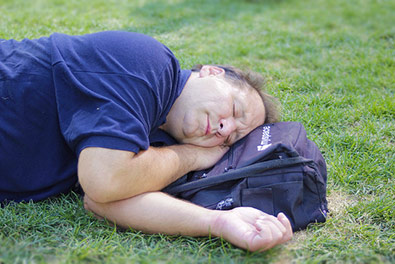
After your doctor diagnoses sleep apnea, the next step is treating it. The first and usually most important way to treat it is to try the following self-help options, especially if you have mild sleep apnea. These may help you avoid nocturnal breathing devices. However, if your sleep apnea is moderate to severe, additional measures may be necessary. We’ll discuss those in our next blog post on this topic.
Self-help treatment options for obstructive sleep apnea:
- Lose weight/maintain a healthy weight. A loss of excess weight may help to relieve constriction of your throat. Talk to your doctor about a weight loss program that’s appropriate for you.
- Quit smoking. Smokers are three times more likely to have obstructive sleep apnea than nonsmokers. Smoking may increase the amount of inflammation and fluid retention in the upper airway.
- Avoid caffeine and heavy meals close to bedtime. These measures not only make for a better night sleep, but they also reduce the reflux of stomach contents traveling up the esophagus.
- Avoid alcohol, sedatives and sleeping pills. These relax the muscles in the back of your throat that interfere with breathing.
- Establish a sleep schedule. Your body is controlled by hormones that have a regular rhythm; so try to go to sleep at the same time every night and rise at the same time every morning. Apnea episodes decrease when you are well rested.
- Sleep on your side. Sleeping on your back may cause your tongue and soft palate to rest against the back of your throat and block your airway. Sleeping on your side will help prevent this. One trick is to sew a tennis ball to the back of your pajama top. When you roll onto your back, the ball will press on your back, you will feel uncomfortable and naturally roll to your side.
- Throat exercises. A study published in The American Journal of Respiratory and Critical Care Medicine reports that throat exercises may reduce the severity of sleep apnea by building up muscles around the airway, making the muscles less likely to collapse at night. Another study demonstrated that playing a wind instrument called a didgeridoo was effective.
- Keep your nasal passage open when you sleep. For patients with allergies and other nasal obstructions, the use of antihistamines and prescription nasal sprays may provide significant relief from snoring and sleep apnea.
Because sleep apnea is associated with cardiovascular problems, hypertension, daytime fatigue, and complications with medications and surgery, we encourage you to schedule an appointment with us if you are experiencing symptoms.
For additional information, see our previous blog posts “Do you have sleep apnea?” and “Diagnosing sleep apnea.”
 (541) 233-4064
(541) 233-4064 
